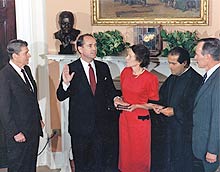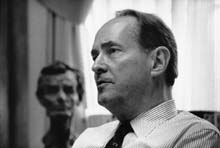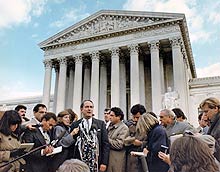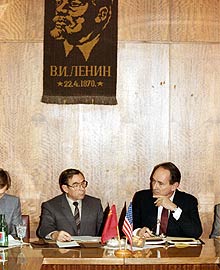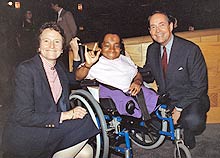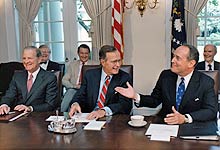The collection
Attorney General of the United States (1988–1991)
Extent: 216 linear feet
On July 9, 1988, Thornburgh, then director of Institute of Politics at Harvard University, received a call from the Reagan White House. Edwin Meese, Attorney General of the United States, had resigned. Thornburgh states in his book: “My law enforcement, political, and management record, as well as my good relations with the president and vice president, did seem to make me one of the logical candidates [for attorney general], but I was hardly expecting Culvahouse’s call” (Evidence, p. 201). After several meetings in Washington with members of the president’s staff, Thornburgh met with President Reagan on July 12, who formally requested that Thornburgh serve as his attorney general. This announcement was accompanied generally by very favorable commentary, such as that in The New York Times: "Mr. Thornburgh, who made his reputation fighting public corruption, brings an ethical dimension that has rarely been in greater demand.” At that time, President Reagan had but five months remaining in his presidency; however, after the election, on November 19, President-elect Bush wasted no time in asking Thornburgh to stay on.
On October 7, 1988, Thornburgh first addressed the entire department staff to spell out his priorities, which he described as: “a vigorous assault on drug trafficking; a continued focus on organized and white-collar crime; and stepped-up activity in the civil rights, antitrust, and environmental fields” (see online video). The savings and loan scandal was about to break and was the most pressing challenge in the area of white-collar crime, or what Thornburgh frequently described as “crime in the suites.” Ultimately, Department of Justice (DOJ) task forces obtained nearly six hundred convictions, a 93 percent conviction rate, over the three years Thornburgh served, with 77 percent of those convicted receiving jail terms.
Other major white-collar scandals and topics that attracted a lot of attention include: Bank of Credit and Commerce International (BCCI) money-laundering scandal, Banca Nazionale del Lavoro (BNL), the Institute for Law and Social Research (INSLAW) case, Iran-Contra (involving issues concerning the independent counsel statute), and the inquiry into Operation Ill Wind.
In tackling the drug problem, Thornburgh frequently startled his listeners by stating: “If you want to lose the war on drugs, just leave it to law enforcement." As many of his speeches continue: the war against drugs will not be won in the courtroom ... but in the classroom ... in our churches, homes, and communities ... on the field of values.” The “Report to the President” on drug trafficking, dated August 3, 1989, is available here online and presents a complete and accurate picture of drug trafficking within the United States and a “road map” for enforcement.
Many of Thornburgh’s antidrug activities also involved a stepped-up international offensive. Thornburgh traveled to Vienna, Austria, to sign the United Nations Drug Convention on behalf of the United States, in December 1989, and attended a number of Terrorism, Radicalism, Extremism, Violence International (TREVI) meetings, which are the law enforcement counterpart to the European Economic Community. The war on drugs also extended to South and Central America, and the efforts of Thornburgh and the DOJ are well represented in these files, as well as the apprehension of Noriega. “The drug war is an unappetizing battle, first, last, and always. ... Nevertheless, our drug enforcement effort was generally well received, especially in its international aspects” (Evidence, p. 238).
Attorney General Thornburgh argued two cases before the Supreme Court, the second of which, Payne v. Tennessee, concerned victim’s rights, a subject of long-standing concern. Other topics well presented in these files are, for example: Project Triggerlock (regarding violent career criminals), the terrorist bombing of Pan Am Flight 103, the bombing and death of Judge Robert Vance, Operation Weed and Seed, and Superfund hazardous waste cleanup actions. The Exxon Valdez case resulted in a guilty plea, and fines and restitution which were "by far the largest amount ever paid as a result of environmental violations” (Evidence, p. 250).
While Thornburgh was attorney general there generally was a huge increase in activity in the international arena, which in late 1990 resulted in the establishment of a new DOJ Office of International Affairs, at Thornburgh’s urging. In September 1990, Thornburgh traveled to Seoul, South Korea, for the first-ever gathering of 24 Asian and Pacific Rim attorneys general, and the insights gained and contacts made during international trips were “of considerable value in establishing and implementing DOJ’s international agenda” (Evidence, p. 257).
“Beginning in late 1989, [Thornburgh] became active in efforts to promote the rule of law in other nations. One extraordinary opportunity in this regard arose in the Soviet Union, which was in the throes of transformation. Premier Mikhail S. Gorbachev had undertaken to depart from the totalitarian past through glasnost (openness) and perestroika (restructuring). To help him create a ‘law-based state,’ the Soviet Ministry of Justice [and Justice Minister Veniamin F. Yakovlev] invited us to visit Moscow to discuss democracy, the rule of law and human rights ... marking the first visit ever by a sitting attorney general of the United States to the Soviet Union” (Evidence, p. 257). The Cold War was soon to end, and of all those Thornburgh had met, Yakovlev was the principal survivor. It is with him that a cordial relationship has extended into Thornburgh’s ongoing career, with meetings both in Russia and in the United States, jointly promoting the rule of law.
After years of commitment by both Dick and Ginny Thornburgh to extending the rights and opportunities of persons with disabilities, Attorney General Thornburgh was presented with a truly unique opportunity in the work to enact the landmark Americans With Disabilities Act (ADA). Thornburgh was proud to serve as the Bush administration’s “point man” for this effort, and the ADA was signed into law on July 26, 1990. Thornburgh states: “The day was a high point of my tenure as attorney general, and I will never forget the celebration of what columnist David Broder called ‘arguably the most significant civil rights and social policy legislation to become law in more than a decade.'" In signing the bill, President Bush presented signing pens to all on the stage, “but Harold Wilkie told him to give his pen (which he had accepted with his right foot) to Ginny Thornburgh in token of her vigorous efforts in support of the bill” (Evidence, p. 262). Both Dick and Ginny Thornburgh continue to be repeatedly recognized and celebrated for their commitment to persons with disabilities in their ongoing careers, represented in this collection.
Other matters on the domestic front that are also well represented in these files include Thornburgh’s participation in the Council on Competitiveness (CC), the Domestic Policy Council (DPC), Economic Policy Council (EPC), judicial appointment issues, and the so-called Thornburgh Memorandum.
On April 4, 1991, the news came of Pennsylvania Senator John Heinz’s tragic death in a plane crash. A special election was to be held in the fall to fill the vacancy. Governor Casey appointed his labor and industry secretary, Harris Wofford, to serve in the interim. The Republicans, keen to hold on to the seat, encouraged Thornburgh to run for the office. And so it was that on June 4 Thornburgh told President Bush and his cabinet that he intended to resign and seek the Republican nomination for the position. Meanwhile a bombshell descended, in the form of a legal challenge by Jack Trinsey regarding the procedures for filling the vacancy. Therefore, it was not until August 6 that the case was resolved and the election in November was a certainty. Thornburgh left office, precisely three years after he began as attorney general, less than three months from Election Day.
When addressing the assembled attorneys and staff for the last time as attorney general of the United States, on August 15, 1991, Thornburgh proudly set forth their record of accomplishments, and “I noted what a privilege it had been to spend a substantial part of my professional career, under five presidents, in the Department of Justice, and called for God’s blessing upon the department, the men and women who make it work, and all in this world who strive to achieve that which is good, right, and just. With that I said, I was off to a ‘first-ever Thornburgh family reunion [and] to my beloved Pennsylvania and an exciting campaign for the U.S. Senate.’ I could not have imagined a more satisfying farewell from my colleagues” (Evidence draft, p. 839–40).
The files here are in fourteen sections, as follows: Speeches; News Releases; Transcripts; Nomination and Confirmation; Attorney General's Files; Daily Schedules; Foreign Trips; DPC, EPC, and CC; Department of Justice Issues; Weekly Reports; Correspondence; News Clippings; and Reports. Each section has an instructive note for researchers.
